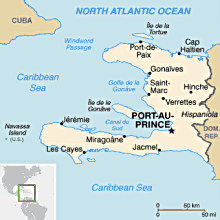
Helen Evans
Deputy CEO, GAVI
2013

Haiti is at the forefront of one of the most important developments in global health.
On Saturday, this beautiful country – devastated by earthquake and hurricane – will become the 14th GAVI-supported country to introduce lifesaving rotavirus vaccines into its national immunisation programme joining four other GAVI countries in the Americas region: Bolivia, Guyana, Honduras and Nicaragua.
The introduction of rotavirus vaccine is a tangible symbol of Haiti’s effort to rebuild and protect its children. It is a remarkable achievement just three years after a 7.0 magnitude earthquake demolished the Ministry of Health, destroyed or seriously damaged 30 hospitals, and took the lives of 230,000 people, including some 300 health workers.
I am honoured to represent the GAVI Alliance at the launch, in partnership with the Haitian Ministry of Health, the Pan American Health Organization (PAHO), UNICEF and the World Health Organization (WHO).
Rotavirus, which causes severe diarrhoea, takes the lives of more than 2,200 Haitian children every year, accounting for nearly half of all under-five diarrhoea-related deaths in Haiti. Globally, more than 1,200 children each day will die as a result of rotavirus.
The introduction of this new vaccine – the capstone to PAHO’s Vaccination Week in the Americas and WHO’s World Immunization Week (WIW) – puts the government of Haiti at the forefront of developing countries, demonstrating significant leadership.
I applaud Haiti’s leaders for making child health a top-priority. Their commitment to routine immunisation services will create a backbone that supports the rest of society as Haiti rebuilds.
Rotavirus is highly contagious and resilient. Typical interventions that stop many bacteria and parasites that cause diarrhoea, including cholera – improvements in hygiene, sanitation and drinking water – do not adequately prevent the spread of rotavirus. Rotavirus disease cannot be treated with antibiotics or other drugs. Vaccination is the best way to prevent severe rotavirus disease and reduce its burden.
The good work of PAHO and WHO to highlight the critical need for immunisation is admirable. In its second year, World Immunization Week builds on a decade of Vaccination Week regional campaigns that have helped vaccinate more than 411 million people in Central America, South America and the Caribbean, led by PAHO.
Last year, in conjunction with Vaccination Week and World Immunization Week, Haiti introduced pentavalent vaccines in partnership with GAVI. Its target: protect more than 200,000 children against five deadline diseases: diphtheria, tetanus, pertussis (also known as whooping cough), Haemophilus influenzae type B and hepatitis B.
GAVI has been a partner with Haiti for twelve years, with over US$ 24 million committed through 2015 to support its immunisation programs. It is an honour that GAVI can play a role in the rebirth of Haiti’s public health system. When I see the faces of its children at ceremonies this Saturday, I will see the future of Haiti and appreciate the lasting difference that immunisation makes.
This blog post is also featured on One.org.
